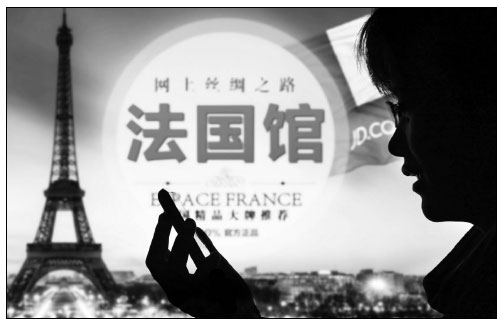Counterfeit products continue to be sold online despite repeated crackdowns, which is a challenge for countries worldwide, said Richard Yung, French senator and president of the French National Anticounterfeiting Committee, at a press conference on June 2 in Beijing.
"Fake goods will damage both the interests and health of consumers, and also cause great loss to trademark and other intellectual property rights holders in terms of sales and corporate images," Yung said.
Leading a group of IP experts, the senator came to China on June 1 to exchange experiences with Chinese IP authorities and promote their "effective measures" used to fight online IP violations.
Yung's three-day trip was a follow-up to the commitment of Zhang Mao, head of the State Administration for Industry and Commerce, to enhance cooperation with French IP authorities on regulation of online transactions during his meeting with French Ambassador to China Maurice Gourdault-Montagne in February in Beijing.
An ever increasing number of Chinese people prefer to shop on the Internet.
According to a Bain & Company report on the Chinese luxury market in 2014, Chinese consumers bought about 75 billion yuan's ($12.1 billion) worth of luxury goods through "daigou" agents, or overseas personal shoppers who buy and send luxury goods to customers in China, accounting for nearly 50 percent of store sales in China last year.
Most of the agents provide services through the Internet.
Yung said they had meetings with Chinese representatives from the Ministry of Commerce, as well as the State Administration for Industry and Commerce, and the General Administration of Quality Supervision, Inspection and Quarantine to discuss bilateral cooperation and introduce a French mechanism against online counterfeiting.
Jean-Baptiste Barbier, IP counselor at the French embassy in China, said France suffered rampant online sales of fake goods in 2008, which triggered waves of complaints from consumers, and litigation cases between brand owners and e-commerce platforms.
This moved the French government to initiate a dialogue between the platforms and brand holders.
After nine months of consultations and negotiations organized by the French National Anti-Counterfeiting Committee and the French Industrial Property Office, a preventive charter was founded between the major e-commerce platforms and more than 500 French and international brands, Barbier said.
The charter provided a set of preventive measures and reactive procedures, to be implemented through continuous cooperation between the parties, he said.
E-commerce platforms, for example, set up technical detection tools or filters based on information provided by IPR holders.
These tools include key words showing the counterfeit nature of products offered for sale, identity verifications, as well as an identification of dubious offers, detection of repeat offenders and an analysis of sellers' profiles and behaviors, he added.
"These tools are easy to use and are also affordable, aiming to eliminate the possibility of online sales of fake goods in the first place," Yung said.
Barbier said the charter also provides some reactive measures. For example, sanctions against sellers of counterfeit goods include a six-month suspension or closing of their accounts.
After 18 months of the charter being in place, the volume of online fake products significantly decreased, as did the number of claims, he added.
The mechanism has already become an industrial standard in France and is also widely promoted abroad as an example of good practice. The European Union adopted a similar initiative in 2011.
Yung and his team wanted to share the mechanism with China and hoped to be supported by related authorities. "Chinese governmental agencies were carrying out research based on the country's specific situations," Yung said.
However, the French authorities and large French companies are developing contacts with the major Chinese e-commerce platforms, social media platforms and search engines to offer assistance to implement the tools, Barbier said.
"The system of filters is also suitable for geographical indications, especially for well-known names which are misused by online sellers to designate products not coming from the region, thus damaging the image of the GI products," said Wang Wei, director of the French Champagne Bureau in China.
Haonan@chinadaily.com.cn
|

Chinese online shopping portal JD.com features a sales section called "French Pavilion" on its website that promotes French brands.Provided To China Daily
|
(China Daily 06/10/2015 page17)

